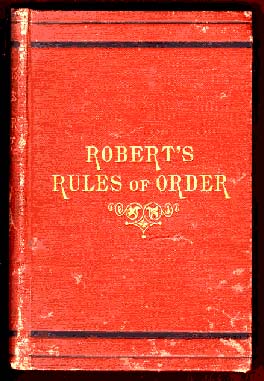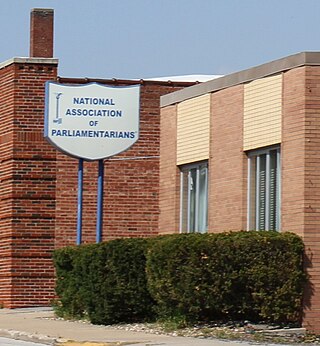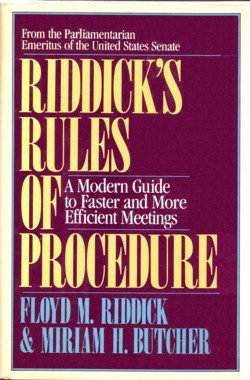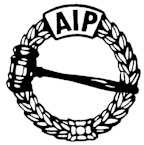
Robert's Rules of Order, often simply referred to as Robert's Rules, is a manual of parliamentary procedure by U.S. Army officer Henry Martyn Robert. "The object of Rules of Order is to assist an assembly to accomplish the work for which it was designed [...] Where there is no law [...] there is the least of real liberty." The term Robert's Rules of Order is also used more generically to refer to any of the more recent editions, by various editors and authors, based on any of Robert's original editions, and the term is used more generically in the United States to refer to parliamentary procedure. It was written primarily to help guide voluntary associations in their operations of governance.

Parliamentary procedures are the accepted rules, ethics, and customs governing meetings of an assembly or organization. Their object is to allow orderly deliberation upon questions of interest to the organization and thus to arrive at the sense or the will of the majority of the assembly upon these questions. Self-governing organizations follow parliamentary procedure to debate and reach group decisions, usually by vote, with the least possible friction.

In parliamentary procedure, a point of order occurs when someone draws attention to a rules violation in a meeting of a deliberative assembly.

Minutes, also known as minutes of meeting, protocols or, informally, notes, are the instant written record of a meeting or hearing. They typically describe the events of the meeting and may include a list of attendees, a statement of the activities considered by the participants, and related responses or decisions for the activities.
An agenda is a list of meeting activities in the order in which they are to be taken up, beginning with the call to order and ending with adjournment. It usually includes one or more specific items of business to be acted upon. It may, but is not required to, include specific times for one or more activities. An agenda may also be called a docket, schedule, or calendar. It may also contain a listing of an order of business.

The National Association of Parliamentarians (NAP) is an organization with membership predominantly in the United States that says that it provides services and products to help its members and others to learn how to proceed with and manage meetings of assemblies such as school boards, homeowners associations, church boards, and volunteer organizations. It also provides education and accreditation for parliamentarians who provide services to these types of organizations.
A parliamentary authority is a book of rules for conducting business in deliberative assemblies. Several different books have been used by legislative assemblies and by organizations' deliberative bodies.
In US parliamentary procedure, the previous question is generally used as a motion to end debate on a pending proposal and bring it to an immediate vote. The meaning of this specialized motion has nothing to do with any question previously considered by the assembly.

The Standard Code of Parliamentary Procedure is a book of rules of order. It is the second most popular parliamentary authority in the United States after Robert's Rules of Order. It was first published in 1950. Following the death of the original author in 1975, the third (1988) and fourth (2001) editions of this work were revised by a committee of the American Institute of Parliamentarians. In April 2012, a new book, entitled American Institute of Parliamentarians Standard Code of Parliamentary Procedure (AIPSC) was released, followed by a second edition in 2023.
In parliamentary procedure, reconsideration of a motion may be done on a matter previously decided. The motion to "reconsider" is used for this purpose. This motion originated in the United States and is generally not used in parliaments. A special form of this motion is reconsider and enter on the minutes.
In the United States, a parliamentarian is an expert on parliamentary procedure who advises organizations and deliberative assemblies. This sense of the term "parliamentarian" is distinct from the usage in parliamentary republics and monarchies as a synonym for member of parliament.
In United States parliamentary procedure, a suspension of the rules allows a deliberative assembly to set aside its normal rules to do something that it could not do otherwise. However, there are rules that cannot be suspended.

Demeter's Manual of Parliamentary Law and Procedure is a parliamentary authority manual by George Demeter. It is included in the bank of study materials used in preparing for the Certified Parliamentarian (CP) designation offered by the American Institute of Parliamentarians. Similar to Robert's Rules of Order, Demeter's Manual notes, "Without rules, there would be injustice and confusion. Hence, it is as necessary to follow the rules of parliamentary law as it is to follow the rules of a ball game or a card game." The book attempts to include everything a presiding officer might need to know, including public courtesies and ceremonies; sample prayers for opening a meeting; organizing a new lodge, chapter or post; times of fraction and discord; acquisition of new members; installation of officers; and adjournment. Chapter 16 contains an "entire meeting in drill form," designed to illustrate a range of parliamentary motions and situations and how a chairman would handle them. Demeter also devotes space to discussing strategic use of parliamentary procedure. The book concludes with "The Greatest Convention Ever Held", an account of the Creation in parliamentary terms.

Riddick's Rules of Procedure is a parliamentary authority - a book explaining the parliamentary procedure, including the rules, ethics, and customs governing meetings and other operations of the United States Senate. It was written by Floyd M. Riddick and co-authored by Miriam Butcher. The book is based on Riddick's experience as parliamentarian of the Senate as well as the procedures of assemblies using parliamentary manuals such as Robert's Rules of Order, and is arranged in a glossary style.
In a deliberative assembly, disciplinary procedures are used to punish members for violating the rules of the assembly.
The history of parliamentary procedure refers to the origins and evolution of parliamentary law used by deliberative assemblies.
Parliamentary procedure is the body of rules, ethics, and customs governing meetings and other operations of clubs, organizations, legislative bodies, and other deliberative assemblies. General principles of parliamentary procedure include rule of the majority with respect for the minority.
In parliamentary procedure, the verb to table has the opposite meaning in the United States from that of the rest of the world:
The American College of Parliamentary Lawyers (ACPL) is a professional association of lawyers from the United States and Canada.

The National FFA Organization, often referred to simply as FFA, is an American non-profit career and technical student organization, which offers middle and high school classes that promote and support agricultural education. FFA was founded in 1925 at Virginia Polytechnic Institute, by agriculture teachers Henry C. Groseclose, Walter Newman, Edmund Magill, and Harry Sanders as Future Farmers of Virginia. In 1928, it became a nationwide organization known as Future Farmers of America.









